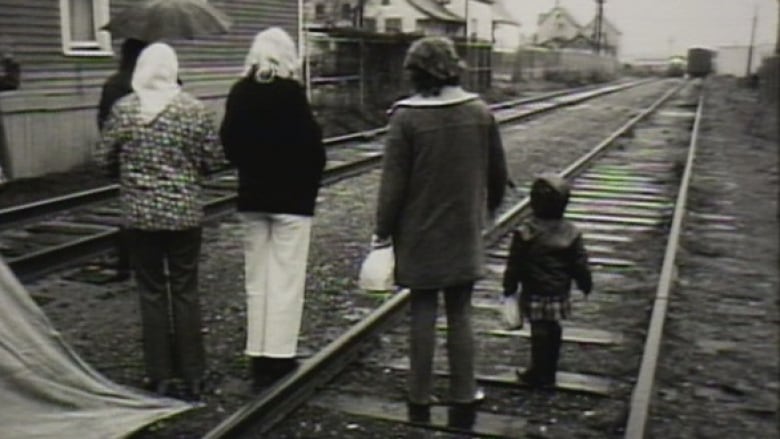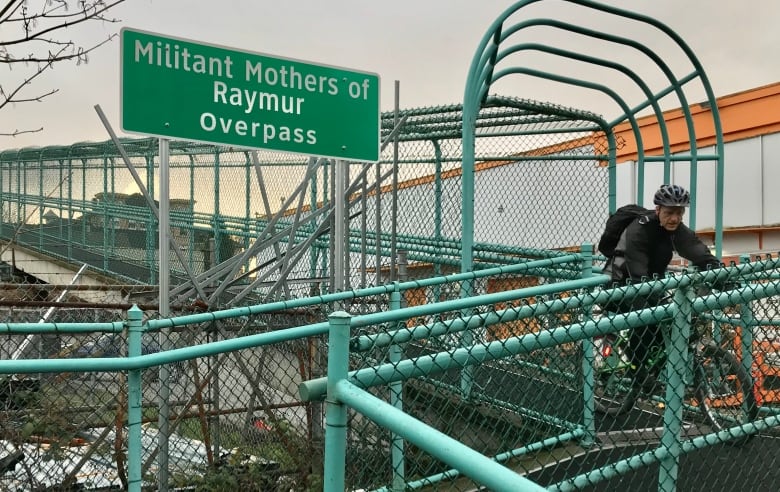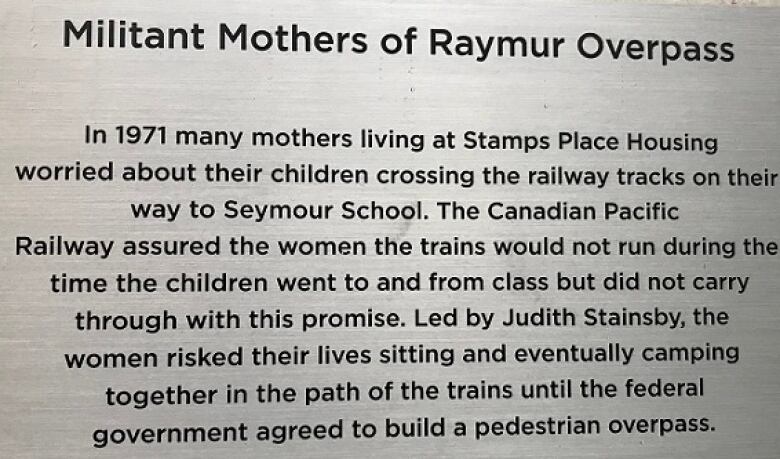50 years later, Militant Mothers of Raymur celebrated in Vancouver
In 1971, 25 women from the Raymur housing project blockaded rail lines in a fight for their children's safety

The 25 mothers who blockadedrail lines in East Vancouver 50 years ago in a fight for their children's safe passage to and from schoolare finally having their inspired act of civil disobedience recognized by the city.
Signs commemorating the newly renamed Militant Mothers of Raymur Overpass have been installed at either end of thebright blue structure spanning therail linesthat run north-south through Strathcona.
There's also a plaque that hints at the mostly forgotten story of the women many of them single mothers who stared down trains, and battled governments and powerful businessmen until they capitulated and agreed to build an overpass.
The late Judith Stainsby is named as the leader of the Militant Mothers of Raymur. But daughter Meg saysher mom would be embarrassed to be singledout were she still alive.
Watch: CBC archive footage of the mothers blocking a train.(Video is silent.)
"I think it'sgreat that the history is being acknowledged," said Meg Stainsby"But it wasvery much a collective of women, of moms ...who had a common interest in keeping their kids safe."
The tracks in question cross aone-block route between theRaymur Place housing project (now called Stamps Place)and Admiral Seymour Elementary School.

Stainsby saidit was common for kids from "the projects" to roll under shunting cars or jump over the couplings of slow moving trains to get to the other side. One boy had his feet crushed by a train in the late 1960s.
In January of 1971, after years of promises a safe crossing was coming, the Raymur mothers staged their first blockade.
Stainsbywas seven and recalls going with her two older brothers to visittheir mom on the tracks.
"I remember being a little afraid that shemight get hurtbut also deeply proud of her," said Stainsby.
Watch: Mother Carolyn Jeromeconfronts a CN Rail representative:
"It chokes me up now, butI remember my mom talking about the first time they stared down a train that was threatening to not stop. It was very confrontational."
Anagreement was struck with CN Rail not to run trains in the half hour before and after school. Not only did the company never live up to the promise, its conductors launched a not-so-silentcampaign of harassment.

"There was basically a vindictive reliance on train whistles in the middle of the night those kinds of dirty tricks," said Stainsby. "And of course this was 1971, so the women were basically told to get back to where they belong."
Undaunted, the group erected a second blockade in March of1971, this time pitching a tent on the tracks for two nights and three days.
By this time, a headline in the Vancouver Sun calling them the Militant Mothers of Raymur was starting to stick,and public sentiment was swinging in their favour.
Watch: Mother Jean Amos talks about successfulcourt challengerepealing injunctions served by CN:
The women argued their case at city hall, fought off injunctionswith the help of a volunteer lawyer and simply refused to give up.
Eventually, their demands were met in the form of alegally-binding document that guaranteedthe construction of a pedestrian overpass.The Keefer Street Rail Overpass, as it was named,opened in time for the new school year.
That theMilitant Mothers of Raymur are back in the spotlight 49 years after their victory is no fluke.
Two years ago, former Vancouver Coun.Andrea Reimer suggested the group be included in an initiative to acknowledgewomen and minorities whose civic contributions had gone largely unrecognized.

"A lot of Vancouverites have no clue how that overpass came to be," said Reimer,"so this was an opportunity to lift that story up."
According to Reimer, the Militant Mothers are well known in Vancouver's activist communities, oftenheld up as a symbol ofwhat's possibleeven when you feel powerless.
She also feels there is a timeliness to there-emergence of their story.
"We're having this very lively debate right now around the appropriatenessof blocking rail lines as a legitimate form of protest. And yet here is an example of what happens when communities have done this."
"Those mothers acted out of frustration and fear for their children's lives," she said. "They finally took this step and were ultimately successful."















_(720p).jpg)


 OFFICIAL HD MUSIC VIDEO.jpg)
.jpg)



























































































